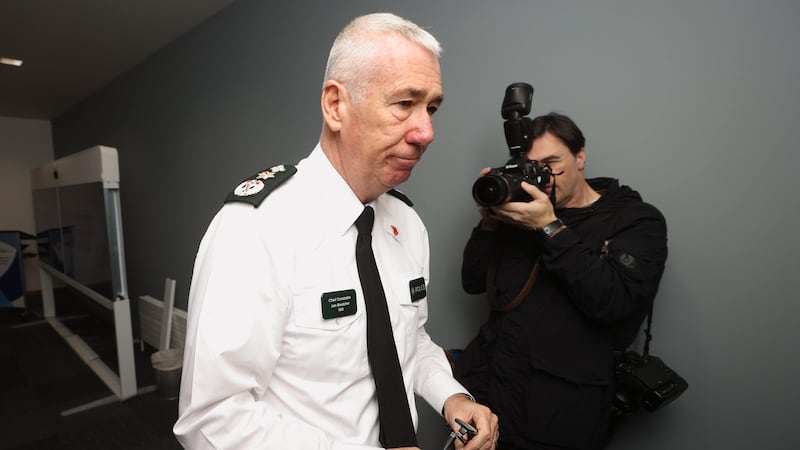A Parades Commission for England has been an idea in circulation since large pro-Palestinian demonstrations began last month. It is proposed in this week's Spectator, a magazine that echoes and influences Conservative thinking.
So it is little surprise Suella Braverman, the outspoken home secretary, has been musing on parallels with "hate marches" in Northern Ireland. Her comments were more unwise than mistaken – irresponsible grandstanding that has infuriated officials and party colleagues.
The first lesson Braverman should have taken from Northern Ireland is how easily tensions can be inflamed. But it is hard not to enjoy the spectacle of Westminster politicians and Whitehall mandarins realising they have a Drumcree on their doorstep – literally outside their office windows, in many cases – requiring solutions they once imposed on an unruly province.
Some of the reaction to the home secretary's remarks suggests a degree of outrage in England at merely being equated to Northern Ireland.
Read more:
- There's no plan to deal with the mess the DUP has created - Brian Feeney
- Newton Emerson: We're driving towards safer, slower roads with compulsory speed limiters on new cars from 2024
- Newton Emerson: Competence or culture war? The DUP's dilemma
**

New chief constable Jon Boutcher has wasted no time highlighting an absurdity of dealing with the Troubles, pointing out that inquiries, investigations and the "industrial scale" of legal actions would scarcely be necessary if the PSNI disclosed what it already has on file.
Boutcher is promising to "change the culture" of non-disclosure, which he said is mainly due to fear of endangering former security force staff and informants.
Any serious move to release more information would run into other objections. Many people have many reasons for not wanting facts revealed, including some who profess themselves truth-seekers. An industry also inevitably creates vested interests.
**
Old Moore's Almanac for 2024 says Northern Ireland will "enter a phrase of reorganisation" next February. As even Jeffrey Donaldson does not seem to know when Stormont might return, this is as dependable a prediction as any other.
The DUP leader was left twisting in the wind by the King's Speech, which sets out the government's plans for the coming year. Apart from a promise to "promote the integrity of the union", it contained no sign of legislation to address unionist concerns.
This could be seen as caution by the government, or an application of pressure, as talks with the DUP supposedly continue. But there was a stronger signal of displeasure in the prime minister's statement accompanying the speech.
It praised the Windsor Framework for "safeguarding Northern Ireland's place in the union". Nothing else was mentioned on the subject.
Rishi Sunak's unmistakeable message to Donaldson was: "I've already fixed this, get back to work."
**
The government's long-promised ban on gay conversion therapy also failed to appear in the King's Speech, leading Alliance to promise a bill in a restored Stormont, where a ban has Sinn Féin, UUP and SDLP support.
It would be intriguing to see if Alliance could draft a bill and retain that support. Although the Conservatives have recently flirted with culture war games on this issue, they have been genuinely committed to a ban – it was their idea.
However, every effort to write legislation runs into impossible contradictions and obstacles. Talking therapies are undefined and unregulated in UK law, even when money changes hands.
So 'gay conversion therapy' effectively refers to private conversations, often in religious contexts. Northern Ireland's rights sector could end up having to defend it.
**
An Antrim midwife has been found guilty of serious professional misconduct on multiple grounds, most of which involve withholding pain relief from women "without clinical justification".
One victim was diagnosed with post-traumatic stress disorder. The midwife will return to practice under supervision.
Given the arcane issues of women's rights that have consumed politics in recent years, there is extraordinary indifference to the life-and-death risk and vast toll of injuries due to 'natural childbirth' mumbo-jumbo.
**
In a rare brandishing of stick over carrot, the Executive Office has suspended funding for a loyalist-linked charity, Action for Community Transformation.
Tommy Harrison, one of its directors, was pictured in the Sunday Life at a memorial parade for UVF killer Brian Robinson. Civil servants who spoke to the paper anonymously said, "there has been a real crackdown internally on scandals like this", and predicted Harrison must quit before funding is restored. However, the Executive Office refused to comment.
Carrot and stick is how 'paramilitary transition' is meant to work and everyone knows it but it is difficult to acknowledge, let alone formalise and announce.
Quite apart from the ethical challenge, much engagement with paramilitarism technically breaks the law. Conversely, Harrison is not accused of breaking the law. A complaint from Alliance about his attendance at the parade could only describe it as "not appropriate".
**
The Ulster Farmers' Union is complaining its members are offered only £5,131 compensation for a pylon on their land, when farmers in the Republic are paid eight times more. Compensation ultimately ends up added to electricity bills.
The average farmer in Northern Ireland receives 87 per cent of their income from the Basic Payment Scheme, a subsidy of £233 per hectare. A large pylon occupies 0.7 per cent of a hectare, which is no longer subsidised if fenced off. So a pylon costs a farmer £1.63 a year in lost subsidy, plus 24 pence of lost income on average. That should be the basis of any compensation.
**

BBC Northern Ireland has managed to upset everyone with two features on young unionists and young nationalists. The unionists were suited, sensible and dull; the nationalists were interviewed at the unveiling of a mural by rap band Kneecap, where they were asked about supporting the IRA.
Both sides now feel they were set up and patronised. They should come together and recognise the real youth issue here, which is that one member of Kneecap appears to be in his mid-40s.








